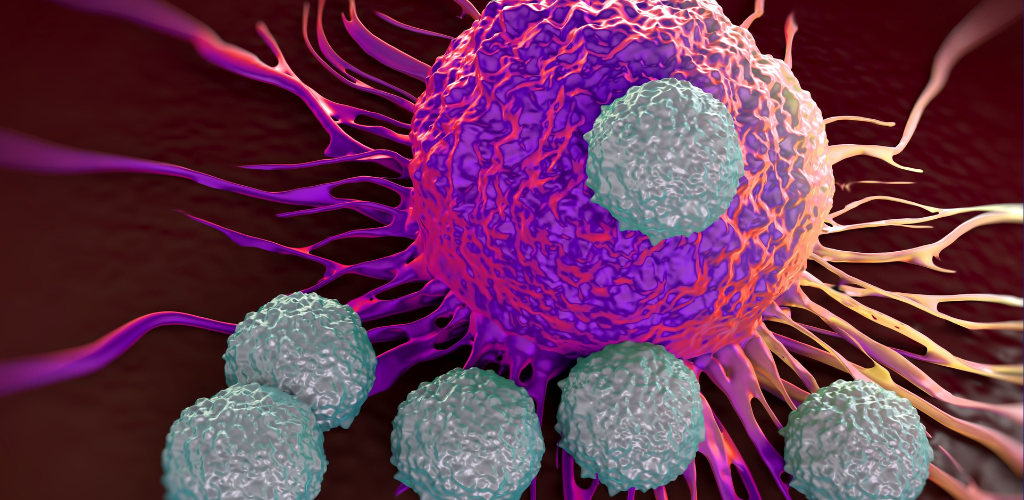Immunotherapy has emerged as a groundbreaking approach in the field of cancer treatment, revolutionising the landscape of oncology. Unlike traditional therapies such as chemotherapy and radiation, which directly target cancer cells, immunotherapy leverages the body’s immune system to identify and destroy malignant cells. This blog aims to provide a comprehensive overview of immunotherapy in cancer treatment, exploring its mechanisms of action, key modalities, clinical applications, and future prospects.
Immunotherapy
Immunotherapy has emerged as a revolutionary approach in the fight against cancer, offering a more natural, targeted, and effective treatment method. Instead of directly attacking the cancer cells, it empowers and fine-tunes our body’s immune system to detect and eradicate these cells. Immunotherapy comes in many forms, including immune checkpoint inhibitors, which inhibit the immune system’s normal dampeners, cancer vaccines, T-cell transfer therapy, monoclonal antibodies, and immune checkpoint inhibitors. It is often used in conjunction with other cancer treatments as part of a comprehensive treatment plan. For some people with cancer, a short course of immunotherapy may be their entire treatment, according to the results of several studies. However, more studies are needed to identify the best candidates for this approach and how best to follow patients. Immunotherapy has revolutionised cancer treatment, and it has shown remarkable success in various cases and provided hope where traditional treatments have failed.
What are the different types of immunotherapy used in cancer treatment ?
The different types of immunotherapy used in cancer treatment include:
- Immune Checkpoint Inhibitors: These are drugs that block immune checkpoints, allowing the immune system to recognize and attack cancer cells.
- Monoclonal Antibodies: Some monoclonal antibodies have an effect on the immune system, making them a type of immunotherapy that helps the immune system recognize and kill cancer cells.
- Cytokines: These are proteins that help boost the immune system. Man-made versions of these proteins are used to treat cancer.
- Cancer Vaccines: Unlike vaccines to prevent disease, cancer treatment vaccines are used for people who already have cancer. They are designed to help the immune system recognize and destroy cancer cells.
- CAR T-cell Therapy: This is a type of adoptive cell transfer and is a potential treatment for certain types of leukaemia and lymphoma.
These different types of immunotherapy work in various ways to help the immune system identify and combat cancer cells.
What are the different stages of immunotherapy treatment for cancer
The different stages of immunotherapy treatment for cancer can vary depending on the specific type of immunotherapy and the individual’s response. However, in general, the stages of immunotherapy treatment may include:
- Assessment and Diagnosis: This stage involves a thorough evaluation of the patient’s medical history, the type and stage of cancer, and overall health to determine if they are a suitable candidate for immunotherapy.
- Treatment Planning: Oncologists and immunotherapy specialists develop a personalised treatment plan based on the patient’s specific condition, which may involve using immunotherapy alone or in combination with other cancer treatments such as chemotherapy or targeted therapy.
- Treatment Administration: The actual administration of immunotherapy, which can be delivered through various methods such as intravenous infusions, oral medications, or injections. The frequency and duration of treatment can vary depending on the specific type of immunotherapy and the individual’s response.
- Monitoring and Follow-Up: Throughout the course of immunotherapy, patients are closely monitored for both treatment response and potential side effects. After the initial treatment period, regular follow-up appointments are scheduled to assess the ongoing effectiveness of the immunotherapy and to manage any potential long-term side effects.
These stages may be adapted based on the individual’s response to treatment and the specific goals of care. It’s important to note that the precise stages of immunotherapy treatment can vary for each patient and should be determined in consultation with a healthcare provider.
What are the side effects of immunotherapy in cancer treatment
Immunotherapy can cause side effects, although they can vary depending on the type of immunotherapy and the individual’s response. Common side effects of immunotherapy include flu-like symptoms such as fever, chills, weakness, dizziness, nausea or vomiting, muscle or joint aches, fatigue, headache, and trouble breathing. Other side effects may include skin reactions at the needle site, pain, swelling, soreness, redness, itchiness, and rash. Less common side effects may include swallowing problems, nausea and vomiting, and pain in the upper abdomen. More severe side effects may include conditions that cause inflammation in your organs. The severity of side effects can vary, and some people may experience no side effects at all. It’s important to discuss any side effects with your healthcare provider, who can help manage them and adjust treatment as needed.
Conclusion :
In conclusion, immunotherapy has emerged as a transformative approach in cancer treatment, harnessing the body’s immune system to target and destroy cancer cells. With its diverse modalities, including immune checkpoint inhibitors, monoclonal antibodies, cytokines, cancer vaccines, and CAR T-cell therapy, immunotherapy offers promising outcomes and renewed hope for patients facing various malignancies. Despite potential side effects, the benefits of immunotherapy in improving survival rates and quality of life underscore its significance in modern oncology. As research continues to advance, immunotherapy holds the potential to further enhance treatment outcomes and redefine the standard of care for cancer patients globally.
Citations:
[2] https://www.cedars-sinai.org/blog/immunotherapy-cancer-care.html
[3] https://www.memorialcare.org/blog/immunotherapy
[4] https://www.cancer.net/blog/2017-08/what-its-taking-immunotherapy-treat-cancer
[5] https://www.browardhealth.org/blog/articles/a-closer-look-at-immunotherapy




